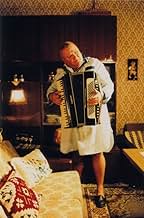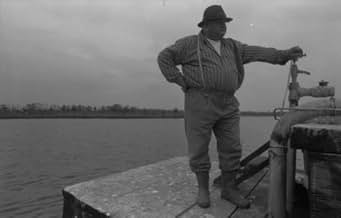IMDb RATING
7.0/10
3.8K
YOUR RATING
Schultze is an accordion player and newly without work. When the local music club celebrates its 50th anniversary, his taste of music changes unexpectedly.Schultze is an accordion player and newly without work. When the local music club celebrates its 50th anniversary, his taste of music changes unexpectedly.Schultze is an accordion player and newly without work. When the local music club celebrates its 50th anniversary, his taste of music changes unexpectedly.
- Awards
- 11 wins & 6 nominations total
- Director
- Writer
- All cast & crew
- Production, box office & more at IMDbPro
Featured reviews
This is a 2003 German film that recently found it's way to my local video store. It is a different film than I usually find, very plain on the surface, yet incredibly complex at the same time. It tells a simple story in a very understated way and the overall effect is quite powerful.
Schultze is a recently retired miner, a hard working man that now finds a lot of time on his hands and not much else. His mother is in a nursing home with dementia, his only family his mates from work who like to share a glass of beer when they get the chance. The imagery in this film is stark and dramatic. The long pauses tempt you to reach for the fast forward button, but they create the emptiness you will understand about Schultze's life. His only bright spot is his accordion, and his membership in the local music club which is celebrating their 50th anniversary. This year they offer a special prize, an expense paid trip to Texas. The club received an invitation from their "sister city" to send one person to their annual German-American festival. The winner will be selected at their Anniversary concert, "may we put you down for your usual polka Schultze?" As the story slowly unfolds, you may begin to see the threads that weave this beautiful tapestry. Or they may be so subtle that they go past you like a line on the sidewalk that you step over everyday. In the end, you will hopefully get the message about going out and finding happiness wherever you can.
Schultze is a recently retired miner, a hard working man that now finds a lot of time on his hands and not much else. His mother is in a nursing home with dementia, his only family his mates from work who like to share a glass of beer when they get the chance. The imagery in this film is stark and dramatic. The long pauses tempt you to reach for the fast forward button, but they create the emptiness you will understand about Schultze's life. His only bright spot is his accordion, and his membership in the local music club which is celebrating their 50th anniversary. This year they offer a special prize, an expense paid trip to Texas. The club received an invitation from their "sister city" to send one person to their annual German-American festival. The winner will be selected at their Anniversary concert, "may we put you down for your usual polka Schultze?" As the story slowly unfolds, you may begin to see the threads that weave this beautiful tapestry. Or they may be so subtle that they go past you like a line on the sidewalk that you step over everyday. In the end, you will hopefully get the message about going out and finding happiness wherever you can.
Calling this movie boring misses the point. Many people aren't used to really *watch* films, i.e. read the pictures. This films' pictures speak such a humourous and humanist language that dialogue is simply not needed. They tell you how important it is to live your dream - even if it's only the small dream of an elderly, not very handsome or clever man. Schultze is just not the type who speaks a lot - his story is worthy to be told nevertheless.
I laughed a lot seeing this, it also touched me. Great camera work, the film really trusts the power of pictures. To me it's the best German movie of 2004 so far (and I've seen "Gegen die Wand", which I liked very much).
I laughed a lot seeing this, it also touched me. Great camera work, the film really trusts the power of pictures. To me it's the best German movie of 2004 so far (and I've seen "Gegen die Wand", which I liked very much).
If you liked STRANGER THAN PARADISE (1984) or BAGDAD CAFE (1988) or enjoy the stunning color photos of Joel Meyerowitz, you have the qualifications necessary to enjoy SCHULTZE GETS THE BLUES. True, it's somewhat slow, but its slowness allows the willing viewer to appreciate the subtly perfect ways the characters move within the mostly static compositions Michael Schorr serves up. True, it's quirky and has a sudden and unsettling if ultimately lyrical ending, but like the two films mentioned above, it gives us a splendid "outsider" view of America that makes us appreciate unique qualities we might otherwise overlook. Its humor is filled with love for the differences which make us human. Come to think of it, anybody who's watched NAPOLEON DYNAMITE (2004) more than once might well enjoy SCHULTZE's journey, too. Join him for the trip.
Sehr gut! This wonderful slice of life and comment on Thoreau's observation of people "living lives of quiet desperation," is so well done, it leaves me reflecting on it long after having seen it. Schultzie, a retired miner, who plays the accordion and hangs out with his at-loose-ends friends, hears some zydeco one night on the radio and starts to play it. He doesn't even know the name of the tune and certainly has no cultural connections with the music but he plays after hearing it once and extends his experience playing polkas to incorporate this new rhythm and beat into his playing. He does it with such a nonchalance and earnest commitment that he even takes him by surprise. The scene where he plays his new found music with his fellow burghers is amazing. His friends rally to his support while the more traditionalists object to this "nigger music." The whole film is a series of embroidered vignettes of still shots which are pasted on the wall with the characters moving slowly across them. The pace is slow and there are lots of gaps but that only adds to the charm of this delightful little film. It is full of sentiment without becoming sentimental, poignant but never maudlin and lingers long in the memory.
First things first: You will need a lot of patience while watching "Schultze gets the blues". There are no dramatic scenes, no sensational turns or something that blows you out of your seat. Instead, the film develops slowly, working merely with pictures than with dialogues. And this is what it's all about: the boredom of retirement, the concealed longing for something new and the desperate hope of getting the "blues". Schultze, the main actor,tries to seek it by playing a tune he heard on the radio on his accordion, which leads him from Sachsen-Anhalt (in the former East Germany, DDR) to a music festival in Texas. This film is definitely worth watching, although it won't satisfy your desire for action or a surprising plot.
Did you know
- GoofsIn one of the dancing scenes, a crewmember runs across the screen as the camera follows the elderly dancing couples.
- Quotes
Captain Kirk: [while hooking up Schultze's boat] I'm captain Kirk.
- ConnectionsReferences Star Trek (1966)
- SoundtracksLong Temps Passe
Written by Bruce Barnes
Performed by Sunpie and the Louisiana Sunspots
from the album "The Language of New Orleans, Vol. 5: Zydeco"
- How long is Schultze Gets the Blues?Powered by Alexa
Details
- Release date
- Country of origin
- Official site
- Languages
- Also known as
- Шульце играет блюз
- Filming locations
- Production companies
- See more company credits at IMDbPro
Box office
- Gross US & Canada
- $595,071
- Opening weekend US & Canada
- $14,074
- Feb 20, 2005
- Gross worldwide
- $4,034,232
- Runtime1 hour 54 minutes
- Sound mix
- Aspect ratio
- 1.85 : 1
Contribute to this page
Suggest an edit or add missing content

Top Gap
By what name was Schultze Gets the Blues (2003) officially released in Canada in English?
Answer



















